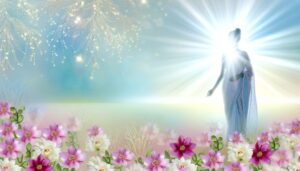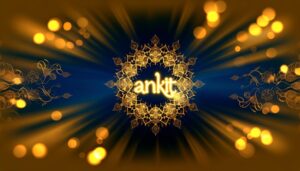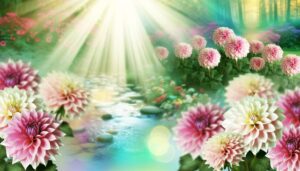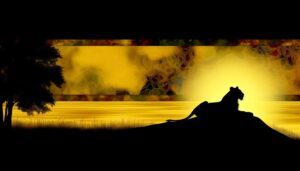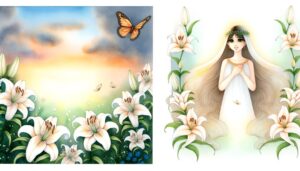Rudra Name Meaning in English
Rudra is an ancient Sanskrit name meaning 'the Roarer' or 'the Howler'. Originating from the root word 'rud', it connotes a powerful, fierce nature, historically linked to Vedic deities of storms and hunts.
Its significance is deeply embedded in Vedic literature, where Rudra is an early form of Lord Shiva, embodying both creation and destruction. Over time, its worship evolved, reflecting a blend of mythological narratives and religious symbolism.
In contemporary culture, the name evokes strength and spiritual resilience. For a deeper understanding of Rudra's rich historical and cultural lineage, continue exploring further.
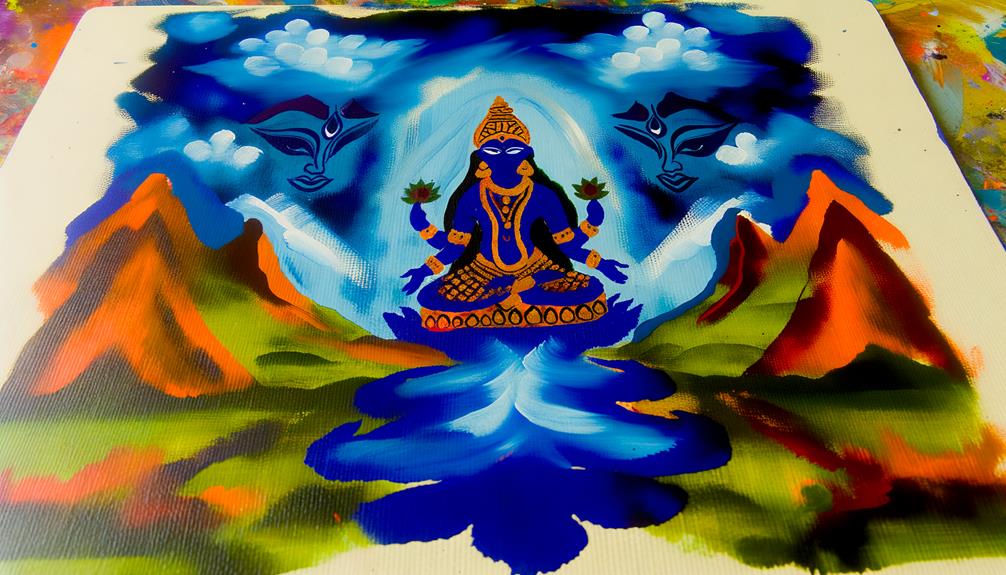
Key Takeaways
- Rudra means 'the roaring one,' derived from the Sanskrit verb 'rud' meaning 'to howl.'
- It symbolizes a powerful and fierce storm deity in ancient Vedic texts.
- Rudra is associated with both destruction and regeneration, embodying duality.
- The name represents strength, resilience, and protection in spiritual contexts.
- Modern usage of Rudra reflects historical and cultural significance, appealing to contemporary and traditional sensibilities.
Etymology of Rudra
The name 'Rudra' originates from ancient Sanskrit and is etymologically derived from the root word 'rud,' which means 'to roar' or 'to howl.' This semantic foundation emphasizes the primal, fierce, and powerful nature attributed to Rudra in ancient texts.
The suffix 'ra' in Sanskrit often denotes a form or manifestation, suggesting that Rudra embodies a roaring or howling force. In Vedic literature, the term 'rudra' is frequently associated with storm and hunt deities, further underscoring its connotations of formidable strength and ferocity.
The linguistic construction implies a being that commands awe and respect, aligning with Rudra's portrayal as a formidable deity. This etymological insight reveals a complex interplay of sound and meaning that defines Rudra's essence.
Historical Background
The historical background of the name Rudra is deeply embedded in ancient Vedic texts, where it is frequently referenced as a powerful deity associated with storms and hunting.
Its etymological origins trace back to the Sanskrit word 'rud,' meaning 'to cry or howl,' reflecting the deity's fierce and tumultuous nature.
Over time, the cultural significance of Rudra evolved, intertwining with the identity of Shiva, illustrating a dynamic fusion of mythological and religious narratives.
Ancient Texts References
Rudra, a significant deity in ancient Vedic texts, is frequently mentioned in various hymns of the Rigveda, particularly in the context of his dual nature as both a benevolent and fierce god.
Rigvedic hymns such as 1.43 and 2.33 depict Rudra as a formidable force of nature, embodying the destructive aspects of storms and illness, yet also as a healer and protector.
The Shatarudriya section of the Yajurveda elaborates on his many attributes and epithets, signifying his multifaceted persona. These ancient texts often invoke Rudra's blessings for protection from calamities and seek his favor for health and prosperity.
This duality underscores his complex character, reflecting the ancient understanding of the interconnectedness of creation and destruction.
Etymological Origins
Understanding Rudra's complex character necessitates exploring the etymological origins of his name, which provides profound insights into his dualistic nature.
The name ‘Rudra’ is derived from the Sanskrit root ‘rud’, which means to cry or howl, reflecting both his destructive and compassionate aspects. Historically, the term ‘Rudra’ has been interpreted in three significant ways: In Vedic literature, Rudra is often described as a fierce, destructive deity associated with storms and wildness. Yet he is also revered as a compassionate healer and protector, often linked with fertility and growth. The meaning of ruhi in English encompasses both of these aspects, representing the duality of Rudra’s nature as both a wrathful and benevolent force in Hindu mythology.
- The Howler: Reflecting his fierce, stormy persona associated with destruction.
- The Red One: Indicating his connection to the red hue of the stormy dawn sky.
- The Roaring God: Emphasizing his powerful, authoritative presence in Vedic texts.
These interpretations underline Rudra's intricate identity, encompassing both his intimidating and protective roles within the Vedic pantheon.
Cultural Significance Evolution
Throughout history, the cultural significance of Rudra has evolved dramatically, reflecting broader shifts in religious practices and societal values.
Initially venerated in the Vedic era as a fierce storm deity, Rudra's image was one of a powerful, albeit unpredictable, force of nature.
As Hinduism progressed from its Vedic roots to the classical period, Rudra's persona merged with that of Shiva, embodying both destructive and benevolent aspects. This duality resonated with evolving human experiences of creation and destruction.
The worship of Rudra-Shiva expanded, encompassing various regional and philosophical interpretations.
Today, Rudra's legacy persists in rituals, literature, and temple iconography, symbolizing the complex interplay of fear, reverence, and transcendence in human spirituality.
Mythological Significance
The mythological significance of the name Rudra is deeply intertwined with its identification with the deity Shiva, who embodies both destructive and regenerative forces.
Rudra's divine attributes, characterized by his fierce and tempestuous nature, are vividly depicted in various Vedic texts, highlighting his role as a powerful and transformative force in the cosmos.
Additionally, the symbolism associated with Rudra in these ancient scriptures underscores the duality of creation and destruction, central to Vedic cosmology.
Rudra as Shiva
Rudra, an epithet of Shiva in Hindu mythology, embodies the fierce and destructive aspects of the divine, symbolizing both the wrath and the transformative power of the deity. This dual nature is crucial to understanding Rudra's mythological significance.
- Destruction for Renewal: Rudra's destructive aspect is not merely about annihilation but is essential for the cosmos' cyclical process of creation and renewal.
- Wrath as Justice: The wrath associated with Rudra is often depicted as a form of divine justice, punishing evil and restoring cosmic balance.
- Symbolism in Rituals: Rudra's presence is invoked in various rituals, emphasizing purification and protection, reflecting his essential role in maintaining cosmic order.
Understanding Rudra as Shiva reveals a complex deity embodying both destruction and regeneration.
Rudra's Divine Attributes
How do Rudra's divine attributes encapsulate the multifaceted nature of this powerful deity within Hindu mythology?
Rudra, often associated with the storm and hunt, exemplifies both destructive and healing qualities. His name, derived from the Sanskrit root 'rud,' signifies 'to cry' or 'to roar,' reflecting his tempestuous and fierce nature.
Yet, as a healer, he is invoked in the Vedas for his ability to cure diseases and alleviate human suffering. Rudra's duality as a fearsome warrior and a compassionate healer underscores the complex interplay of creation and destruction inherent in Hindu cosmology.
This enigmatic deity's attributes highlight the cyclical nature of existence, portraying him as an essential force in the cosmic order.
Symbolism in Vedic Texts
Embedded within Vedic texts, the symbolism surrounding Rudra encapsulates his integral role in the cosmic balance between creation and destruction. Revered as a formidable deity, Rudra embodies multifaceted aspects that are essential to understanding Vedic cosmology.
His mythological significance can be analyzed through:
- Destructive Power: Rudra is often depicted with formidable weapons, symbolizing his role as a divine force of destruction, necessary for the regeneration of the universe.
- Healing Influence: Despite his fierce nature, Rudra is also revered as a healer, indicating the duality of his character.
- Cosmic Balance: As a mediator between life and death, Rudra maintains the equilibrium essential for the cyclical nature of existence.
This intricate symbolism underscores Rudra's pivotal role in Vedic literature.
Rudra in Vedic Texts
In Vedic texts, the deity Rudra is depicted as a fierce and stormy god, embodying both the destructive and healing aspects of nature. Often referred to as the 'Howler,' Rudra's character is multifaceted, representing a duality that is both feared and revered.
The Rigveda, one of the oldest texts, portrays Rudra as a formidable archer whose arrows can bring disease and calamity, yet also possess the power to cure and protect. His association with storms and wildness underscores his unpredictable and potent nature.
The Yajurveda further emphasizes his role as a healer, invoking him for blessings and protection. This duality highlights Rudra's integral role in the cosmic balance between creation and destruction.
Symbolic Meanings
Exploring the symbolic meanings of Rudra reveals a complex interplay of attributes that extend beyond his dualistic nature in Vedic texts. In Vedic literature, Rudra embodies various symbolic dimensions that convey profound existential and cosmic principles.
These can be delineated as follows:
- Destruction and Renewal: Rudra symbolizes the cyclical nature of destruction and creation, essential for cosmic balance.
- Storm and Healing: Paradoxically, Rudra is both a fierce storm deity and a healer, representing the dual forces of chaos and remedy.
- Fear and Reverence: The invocation of Rudra's name elicits both fear and reverence, highlighting his role as a powerful yet benevolent force.
Analyzing these aspects provides a nuanced understanding of Rudra's multi-faceted symbolism, enriching our comprehension of Vedic cosmology.
Cultural Impact
The cultural impact of Rudra's persona is profoundly evident in various aspects of Indian traditions, mythology, and rituals, reflecting his enduring influence across centuries.
As a deity associated with storm and hunt, Rudra's fierce attributes symbolize a primordial force integral to Vedic rituals. His name frequently appears in the Rigveda, underscoring his significance in ancient hymns and prayers.
Additionally, Rudra's dual nature as both a destroyer and healer manifests in the worship practices and iconography, where he is revered for his power to both inflict and alleviate suffering.
Ritualistic recitations of the Rudram, invoking his presence, highlight his continued reverence in religious ceremonies. This duality encapsulates the complex relationship between humans and the divine within Hindu tradition.
Modern Usage
Contemporary interpretations of the name Rudra continue to reflect its rich historical and cultural connotations while adapting to modern contexts. The name Rudra, which signifies 'the roarer' or 'one who eradicates problems,' maintains its strong presence and appeal. In modern usage, it is often chosen for its:
- Symbolic Strength: The name evokes power and resilience, attributes that are highly valued in contemporary society.
- Spiritual Resonance: As a reference to a Vedic deity, it retains a profound spiritual significance, appealing to those with a connection to Hindu traditions.
- Global Adaptability: The name's phonetic simplicity allows it to be easily pronounced across different cultures, enhancing its global appeal.
These factors contribute to the enduring relevance and flexibility of the name Rudra today.
Popularity Over Time
Tracing the popularity of the name Rudra over time reveals significant fluctuations influenced by cultural, religious, and social dynamics. Historically rooted in Vedic traditions, the name Rudra was prevalent during periods of heightened religious observance linked to Hindu deities.
Its prominence waned during colonial eras as Western influences permeated traditional naming conventions. However, the name has experienced a resurgence in recent decades, buoyed by a revival of cultural heritage and identity.
Statistical data indicate a steady increase, particularly in regions with a strong Hindu demographic, reflecting a broader trend towards reclaiming indigenous names. This renewed interest underscores a collective desire to preserve cultural authenticity in an increasingly globalized world.
Understanding these fluctuations provides insight into broader societal shifts.
Rudra in Pop Culture
In modern pop culture, the name Rudra has emerged as a symbol of strength and mystique, often depicted in literature, films, and television series that draw upon its ancient, mythological roots. This trend highlights a fascination with the enigmatic and powerful connotations associated with Rudra.
Notable instances include:
- Literature: Authors frequently bestow the name upon characters to evoke a sense of formidable prowess and enigmatic charm.
- Films: Cinematic works, particularly within Indian cinema, often feature protagonists named Rudra, reinforcing themes of heroism and resilience.
- Television Series: TV shows incorporate the name to add depth and gravitas to pivotal characters, enhancing their narrative impact.
These depictions underscore Rudra's enduring resonance in contemporary storytelling, reflecting its timeless appeal.
Conclusion
Rudra, a name steeped in ancient tradition and profound symbolism, encapsulates diverse facets of divine power and cultural heritage.
From its etymological roots to its mythological and Vedic significance, the name resonates with the ferocity and transformative energy akin to that of a tempest.
As alluded to in the sacred texts, Rudra embodies both destruction and rejuvenation, reflecting an enduring legacy that permeates modern usage and popular culture, thereby maintaining its timeless allure and relevance.

